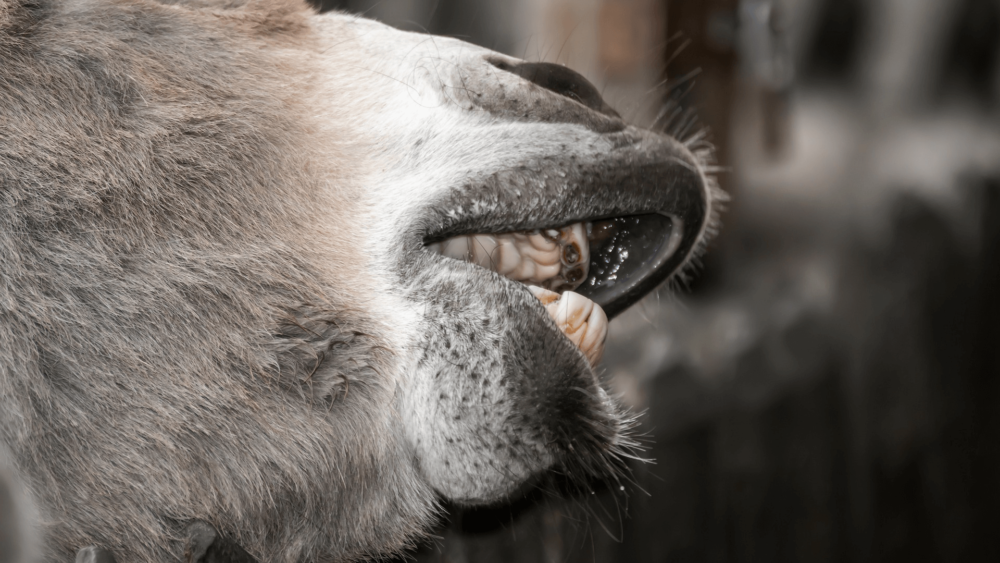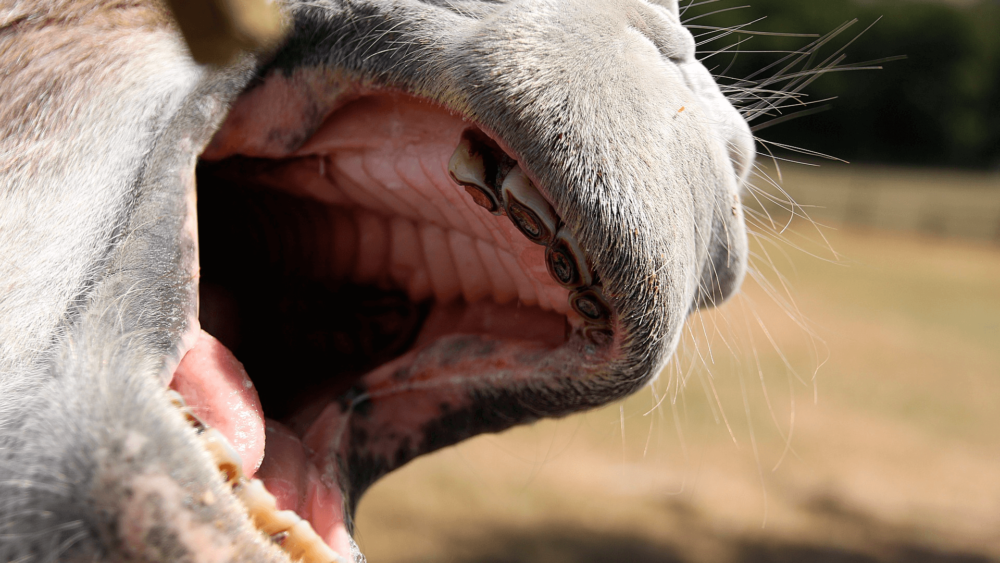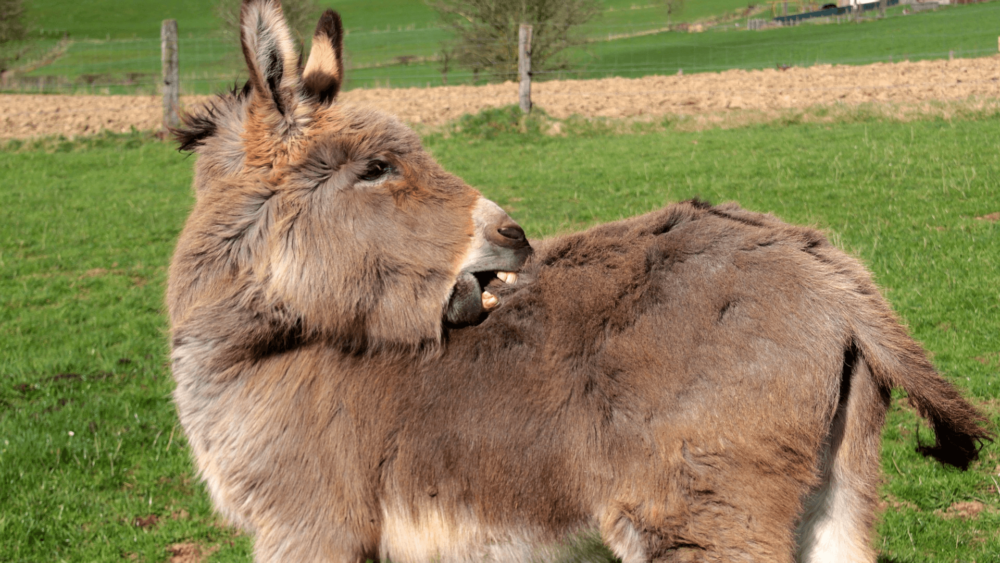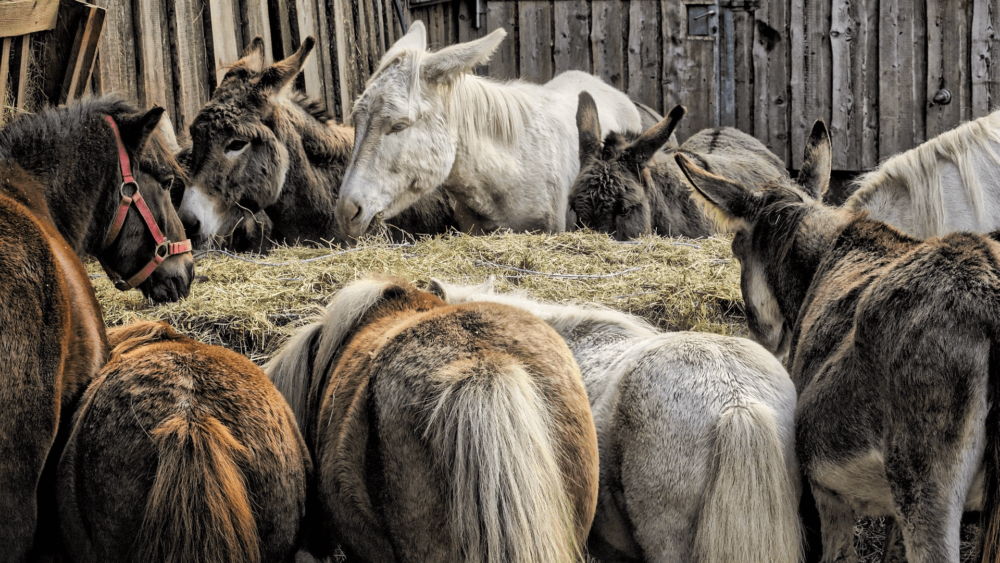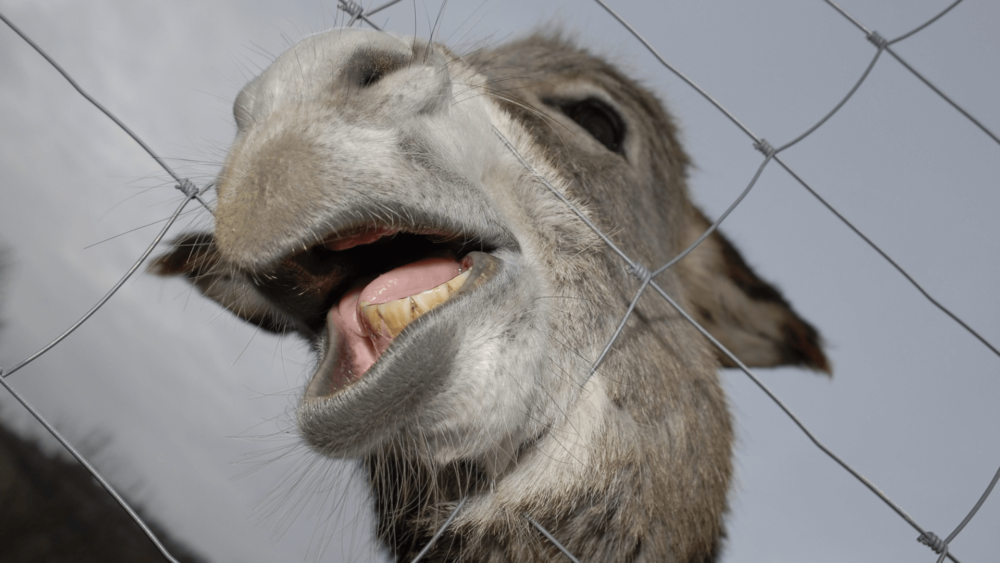Donkeys are easy-going animals most of the time. They prefer to communicate their feelings with a twitch of the ears rather than with aggression. If threatened, however, donkeys will use their teeth and hindlegs to protect themselves, their territory, and their herd.
Why do donkeys bite? Donkeys use biting as a form of communication and discipline. A male donkey will bite others to establish his dominance within the herd and protect his territory. A mother may similarly administer a bite to discipline her foal.
A donkey bite is painful and potentially dangerous. A bite from a donkey’s strong jaws can cause both crush injuries and a loss of tissue. But, what causes donkey bites and how can you protect yourself from a bite?
Understanding Biting in Donkeys
Donkeys aren’t usually aggressive but, in some situations, they won’t think twice about using their teeth in self-defense. This article covers the many reasons donkey’s bite, although a donkey bite is not as often as it may seem like after you read this article. Let’s dive in.
1. Donkeys Bite in Response to a Threat
Donkeys are very territorial, which is why they make such excellent guard animals. If a potential predator enters their territory, they will use all the methods available to them to frighten it off. This may include chasing it with teeth bared and mouth open, kicking out with the hindlegs, and braying.
It’s imperative that you not injure, hit, or attack your donkey. If you do, your donkey will irreversibly see you as a threat and be on alert anytime you are around.
Fear Cuased by Previous Owners Can Cause Biting
A donkey that’s unfamiliar with a person or another animal may feel threatened and respond aggressively, using his teeth to keep that person at a safe distance. Plus, you may have to combat previous experience and fear caused by previous owners in your donkey. Donkeys that experience fear or pain during training will often lash out or try to bite.
A donkey that’s been hurt due to mishandling in the past won’t forget the experience easily. Abused donkeys often see all humans as a threat. As a result, your donkey may use defense mechanisms including biting or kicking, to stop it from happening again.
You will need to start with basic groundwork to earn his trust. You must never get impatient, yell, or act volatile with your donkeys. This will teach them they can’t trust you.
How to Earn A Donkey’s Trust
- Be Consistent and Reliable: Keep regular feed times
- Talk to your donkey when you are areand him
- Groom your donkey daily by brushing him and cleaning out his hooves
- Maintain calm body language, avoid startling your donkey
- Don’t spoil your donkeys with treats. Provide rewards for good behavior
Donkeys Bite As a Response to Pain
Observe your donkey’s behavior, watching to see what causes him to bite. Watch for sensitivities when he lashes out. He may have a painful area that he’s protecting.
If your donkey bites every time you put a saddle on him, it could be because it doesn’t fit correctly and causes him pain. If he bites after eating, it could be in response to pain caused by a problem in the teeth or digestion system.
Watch for reasons your donkey lashes out. Since it’s not a normal behavior, there is usually something that causes it.
An Unfamiliar Environment Could Cause Donkey Aggression
Donkeys may show aggressive behavior when introduced to a new environment, be it a new farm or just a different enclosure. Before they’ve had the opportunity to assess the area for potential threats, a donkey may feel unsettled and defend himself accordingly by showing his teeth and flattening his ears.
When you get a new donkey, give him plenty of space and time to become accustomed to his surroundings. Introduce new companions slowly by keeping them in adjacent pens before combining their living arrangements.
Lack of Training Can Cause Accidental Biting and Nipping
Donkeys routinely nip at eachoother as part of their bonding, mutual booming and courting routines. Donkeys are extremely curious. Young donkeys are often included to put their teeth and lips on their owners as they explore. This can result in nipping or biting. Train your equines not to nuzzle you with their mouth.
Firmly say “No!” when they attempt this. Waive your hands and tug their halter when they try it. It’s also a good idea to train them not to eat directly out of your hands. Train them to eat their treats once you’ve placed it down or when they are in position, not when they ask for it.
If your donkey tries to take a treat with his teeth, then don’t hold a treat for him to take. He may nip you when taking the treat. Instead, bring the treat down over his nose and tuck it into his lips. He will probably learn after a little while to take treats with his lips in this way.
Hormonal Fluctuations Cause Aggression in Donkeys
Jacks are more prone to aggression when female donkeys are in the vicinity. They will compete against each other to impress those females, fighting to the death if necessary. Even though you, as the owner, are not a potential rival, a young male donkey may lash out at you with either its teeth or hooves if you come between him and a potential mate.
A paper on Reproduction in Donkeys by Stephen R. Purdy notes that a jack will pursue a female donkey “very aggressively,” initially. Delivering vicious bites to the neck, hind legs, and back, an aggressive stallion may even draw blood. Females often bite back as part of the ritual as they become ready to mate.
Inadequate Space Causes Territorialism and Higher Aggression
Donkeys have a flight or fight response that’s not dissimilar to horses. If they lack the space needed to move away from something that frightens them, they will use their fight response to defend themselves instead. This territoriality is usually against other animals that come into their space.
But it can also happen if a person invades a highly-stressed donkey’s space as well. A donkey kept in too small an enclosure will be more likely to bite than one with the space he needs to escape a threat.
Studies show that aggressive behavior between donkeys may be reduced when there are enough accessible resources and space for the entire herd.
Lack of Good Nutritional Creates Increased Irritability
Donkeys need a high-fiber, low-protein diet. That means a lot of straw instead of alfalfa. If they can’t get the resources they need to fulfill these nutritional requirements, they will become irritable and aggressive.
Poor nutrition and other dietary-related issues, such as high parasitic loads, can lead to pain-related aggression and elicit biting in donkeys that were previously relaxed and gentle.
Boredom Creates Abnormal Behavior
Domesticated donkeys need stimulation to help prevent abnormal and aggressive behaviors and maintain a wider range of normal activities. A donkey living in an enriched environment full of toys and activities can “express their natural aggression in a non-dangerous manner.”
Establish Your Dominance Within a Donkey Herd
A donkey that tries to bite you may be questioning your dominance. Without being aggressive or provoking an aggressive response in your donkey, you need to establish yourself as the alpha, or herd leader. Be firm without yelling or hitting your donkey. Don’t allow certain behaviors.
You also need to gain your donkey’s trust and respect. You can do this by understanding donkey behavior. Learn to read your donkey’s body language. Use positive training to build trust. Provide safe play and build trust.
Block The Bites When Treat Training
Donkeys respond well to positive reinforcement training using treats to gain your donkey’s trust, and cooperation often has very positive outcomes. Unfortunately, some donkeys are so transfixed by the idea of a carrot or home-baked cookie that they forget their manners and start searching for the treat using their mobile lips and teeth.
If you want to continue using treat training with such an animal and without the risk of being bitten, you need to learn how to block those threats. This video gives some useful tips on how to block a biting donkey.
Harmones that Cuase Biting
A donkey stallion reacts aggressively if he feels his territory or herd is threatened. Getting your stallion gelded reduces their testosterone and the behaviors associated with it, including aggression and dominance.
Correct Negative Donkey Behaviors
You don’t have to punish a donkey or behave aggressively towards it to stop it from performing unwanted behaviors. Non-confrontational reactions such as squirting lemon juice into the donkey’s mouth, pinching him gently, or growling at him will let him know when he’s overstepped the mark.
Lonliness Can Help Curtail Biting
Donkeys are social animals and, if left alone, can become irritable, depressed, and potentially aggressive. Although donkeys make the best companions for other donkeys, they will also bond with horses, pigs, alpacas, and goats if introduced carefully.
Additional Reasons Donkeys Show Their Teeth
Like many equines, donkeys use the Flehmen response to process new smells. You’ll notice the Flehmen response when a donkey curls his top lip up to reveal his teeth. When he does this, he transfers air containing scents and pheromones to the Jacobson’s organ located above the roof of the mouth.
Also known as the vomeronasal organ, the Jacobson’s organ is part of the donkey’s olfactory system. It’s located in the main nasal chamber and consists of a group of sensory cells that detect and process odor particles.
When a donkey shows you his best toothy grin, he’s more likely to be performing a Flehmen response than threatening you. But, donkeys show their teeth in different ways, depending on the situation.
10 Reasons A Donkey Will Threaten to Bite
Donkeys appear threatening and show off their teeth for a variety of reasons. Let’s take a look at why.
- To Process Information About Potential Threats: Donkeys use the Flehmen response to gauge whether another animal is a potential threat or potential mate.
- To Assess a Female Donkey’s Reproductive State: When smelling a female donkey’s urine during the breeding season, a male donkey or jack will use the Flehmen response to establish where she is in her oestrus cycle and when she’ll be ready to mate.
- In Response to Foods and Smells: Certain foods or new smells and flavors will stimulate a donkey’s Flehmen response. Workers at the Donkey Sanctuary in Ireland noticed that ginger biscuits and the perfume of visitors appear to provoke this response most frequently.
- To Familiarize Themselves with a New Donkey Foal: After giving birth, mares exhibit the Flehmen response more than at any other time. They will show their teeth when investigating the amniotic fluids and sniffing their newborn foals.
- To Communicate or Relieve Pain: Horses and donkeys may perform the Flehmen response in an effort to alleviate pain or when there is something caught in their teeth or mouth. They also display their teeth when experiencing colic or other types of abdominal pain.
- In Response to an Unpleasant Taste: Immediately after being given an oral dewormer, many donkeys and horses will register their disgust by curling their top lips and exposing their teeth.
- To Alleviate Anxiety: Equines often yawn and show their teeth when experiencing stress or anxiety. It’s not clear whether this behavior helps alleviate or communicate their emotional state.
- To Express Anger: An angry donkey may bare his teeth while flattening his ears and lunging forward. This behavior is natural for the donkey as a form of territorial defense. This type of aggressive reaction is rarely directed towards humans.
- When Anticipating Food: A hungry donkey eager for his next meal or treat may show his teeth and even nibble at you. While this isn’t necessarily aggressive behavior, it can become dangerous.
- To Relieve Boredom: Domesticated donkeys don’t get the same stimulation as they did in the wild and may develop unwanted behaviors, such as biting or baring their teeth, as a result.
Are Donkeys a Biting Danger to People?
Donkeys are usually docile animals but, during the breeding season, males, in particular, may display more aggressive behavior. Although it’s rare for a donkey to bite a human, if it does happen, it can have serious, if not fatal, consequences.
Several people have been killed or seriously injured by donkey bites. In 2004, a nine-year-old South African boy had to undergo an operation on his face after being bitten by a donkey. In 2012, an American man was killed after a donkey bit him in the neck, causing severe bleeding and subsequent asphyxia.
According to one horse forum contributor, donkeys are more accurate than horses when they bite, making them potentially more dangerous. They may also be able to bite with more force than a horse, despite being smaller. Some theorize that donkeys can open their mouths wider, which enables them to close down on their unsuspecting target with more force.
These cases illustrate why a biting donkey should never be underestimated and why, as an owner, it’s so important to nip such behavior in the bud.
How To Teach a Donkey Not to Bite
When they’re foals, donkeys make just as many mistakes as any other youngster. To discipline them, their mothers will nip them just above the knee. While you can’t kneel and bite your donkey, you can deliver a short, sharp tap on the leg to let them know that their behavior is inappropriate.
Monty Roberts recommends using a similar approach with biting horses, saying, “You want him to associate his effort to bite with a distracting tap on his shin.”
Once you’ve repeated this process several times, the horse or donkey will start to bite but then hesitate and look down at his leg. This is his associative thinking kicking in.
Donkeys learn something new every time you interact with them. They don’t necessarily see their behavior as good or bad but view it simply from a perspective of how effective it is at getting them what they want. If biting leads only to a tap on the leg or a squirt of lemon juice in the mouth, they’ll soon give it up as a bad job.
The closer the desired behavior is to a donkey’s natural behavior pattern, the easier it is for him to learn. That’s why a tap on the leg that resembles a nip from their mothers could prove more effective than a slap on the nose, or a lead rope in the face.
Conclusion
Donkeys aren’t naturally aggressive animals. If they feel threatened, however, it is natural for them to defend themselves using their teeth and powerful hind legs. Donkeys may bite in pain, fear, or anger. Hormonal fluctuations can also provoke aggressive behavior, especially in young donkeys and stallions. Understanding what’s causing your donkey to bite is the first step towards remedying the situation.
My Favorite Equine Resources For Horses and Donkeys
This list contains affiliate products. Affiliate products do not cost more but helps to support BestFarmAnimals and our goal to provide farm animal owners with accurate and helpful information.
Squeaky Chicken Toy is hilarious to watch and the horses love it! It’s not super tough so keep it away from dogs.
Dewormer with Ivermectin: I use this for my horses and my goats. Duvet makes a great dewormer. I switch between the Ivermectin one and one like this one so the worms don’t get immune to it.
Manna Pro Apple Flavored Nuggets are a delicious smelling treat that my horses go crazy over.
Equinity Amino Acid Supplement for Horses makes a big difference for any horse that’s struggling with arthritis, hoof issues, or just generally. It’s great for older horses who can’t absorb all the nutrients in their food as well!
Manna Pro Weight Accelerator helps older horses gain weight and stay healthier! This was especially helpful when one of my older horses lost weight over the winter and helped her regain her weight over the summer!
Farnam Fly Control goes on the horse or donkey and will keep the flies off your sweet pet. It makes horses way more comfortable and will keep sores from getting infected as well.
Wound Kote protects sores and wounds. It acts as an antiseptic and helps wounds heal faster. It works on both my horses and goats.

